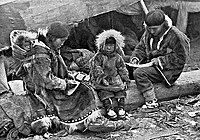
Photo from wikipedia
Pesticide exposures represent inequities among a vulnerable population of migrant and seasonal farmworkers. A social justice theory synthesized from an environmental health research framework, a middle range theory of critical… Click to show full abstract
Pesticide exposures represent inequities among a vulnerable population of migrant and seasonal farmworkers. A social justice theory synthesized from an environmental health research framework, a middle range theory of critical caring, and literature on pesticide exposure is presented as a situation-specific public health practice theory. Concepts from the physiological, epistemological, vulnerability, and health protection domains are related to concepts of critical caring revealing protective strategies for vulnerable populations exposed to pesticides. The key concepts are risk exposure, community assessment, transpersonal health promotion, community competence, and controllability. Protection from exposure involves raising awareness, critically assessing communities, educating for empowerment, building capacity, and advocating to ensure social justice. Critical caring protection is provided in a mutually respectful relationship that promotes responsibility at the individual and population levels.
Journal Title: Public health nursing
Year Published: 2017
Link to full text (if available)
Share on Social Media: Sign Up to like & get
recommendations!